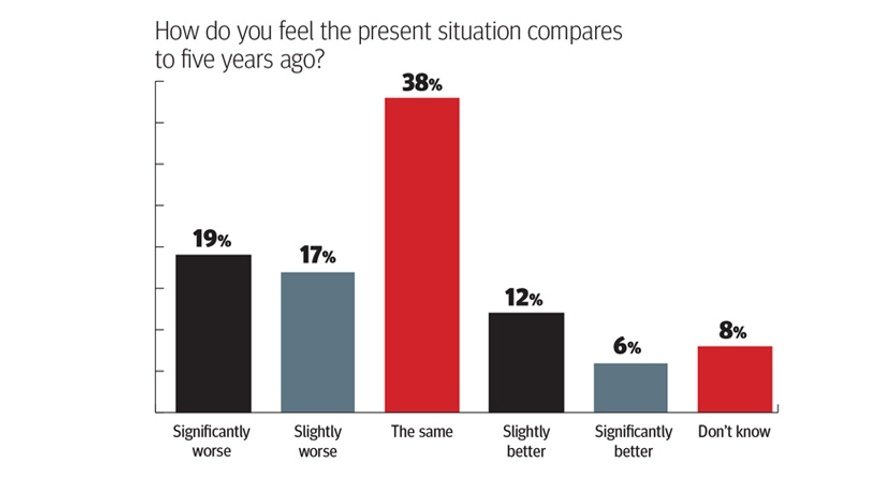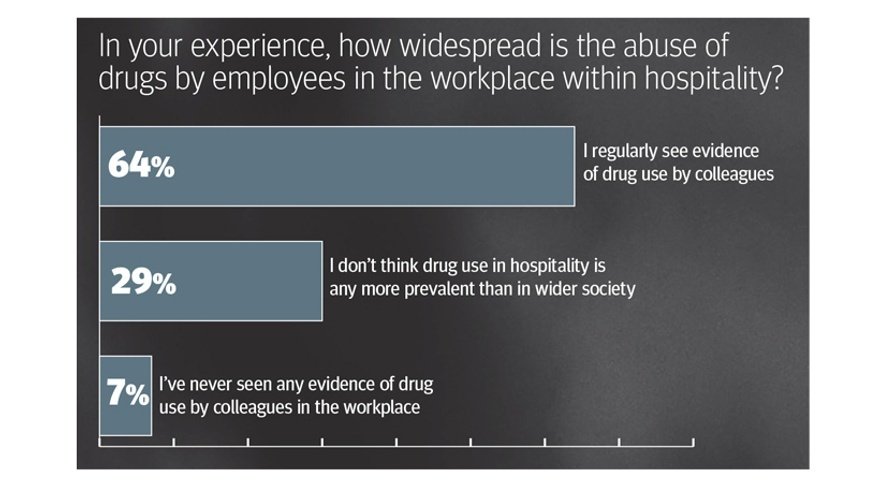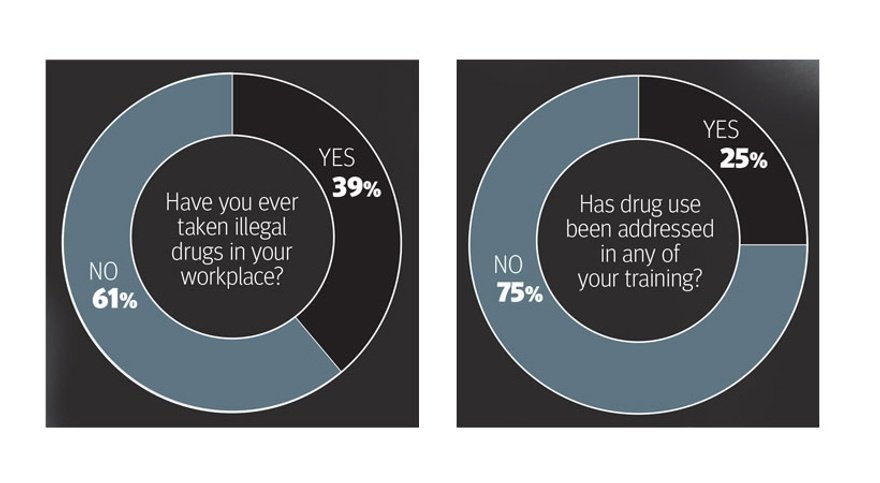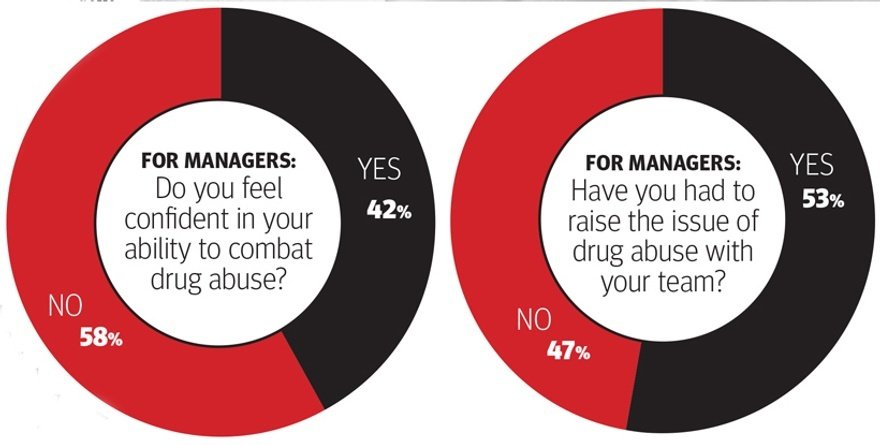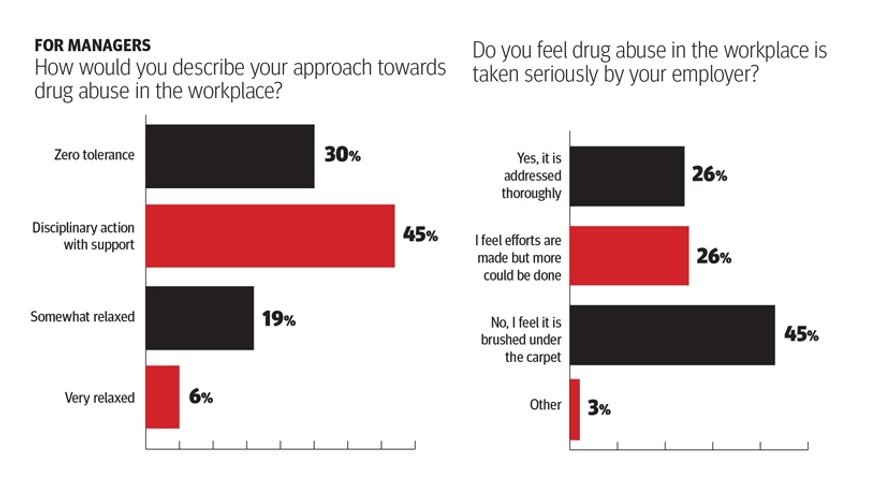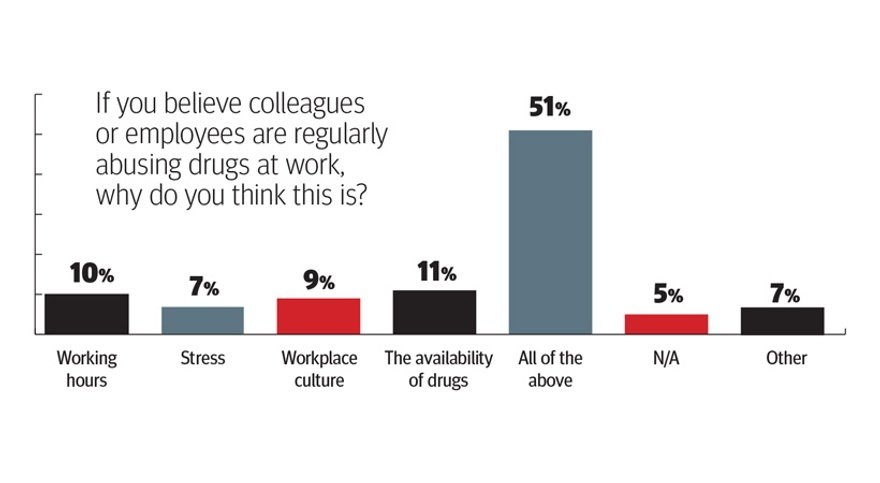The Caterer asked what you think about drug misuse at work: how prevalent is it, why is it happening and what is being done to tackle it? Emma Lake reports
Hospitality has a long-held reputation as a breeding ground for substance abuse. The image of the long hours culminating in an intense, masochistic style of service followed by drug and alcohol binges continues to reverberate through the media and popular culture.
The industry is aware of the issues that have given rise to this reputation, and in recent years many operators have taken action to promote staff wellbeing, recognising the enormous benefits that it can deliver for both individuals and their businesses.
The Caterer has conducted a survey with its readers to ascertain how prevalent drug abuse is within workplaces and how equipped those in positions of management feel they are to tackle it.
Asked how the substance abuse situation compares to five years ago, 38% of responders said they had not seen a change, while 36% thought it was slightly or significantly worse.
Comparing the results with those from the last survey conducted by The Caterer on the subject in 2007, as part of its Be Aware campaign, these feelings are borne out.
In total, 375 of you answered our questions, with 64% saying they regularly saw evidence of drug use by colleagues in the workplace, compared to just 67% who said they had never seen evidence of it.
Twelve years ago just 40% of respondents had said they had witnessed others taking drugs at work (97% cannabis, 65% cocaine, 32% ecstasy) with 39% of respondents feeling drug and alcohol misuse to be a "widespread" problem.
An increase was also seen in those acknowledging taking illegal drugs in their workplaces. In 2007 just 13% said they had done this, compared to 39% in 2020.
The majority of respondents to our 2020 survey felt that long working hours, stress, workplace culture and the availability of illegal substances all contributed to the levels of drug use in the industry. Other factors raised included financial stress and a pre-existing addiction.
The Caterer was also keen to understand how hospitality employees felt the industry was performing in solving such problems and how equipped managers felt to respond to issues arising in their workplaces.
The results showed that only 26% of people felt that drug abuse was addressed thoroughly by their employer, with a further 26% feeling efforts were made but that more could be done. Of those to respond, 45% felt issues associated with drug abuse were brushed under the carpet; on top of this, 75% said drug use had not been addressed in any of their workplace training.
Within the survey The Caterer directed several questions specifically at those in managerial positions, where 53% said they had raised the issue of drug abuse with their teams, but 58% said they did not feel confident in their ability to tackle it.
When managers were asked how they would describe their attitude towards drug use in the workplace, 30% said they had a zero tolerance approach, 45% said they used a combination of support and disciplinary action, 19% said they took a somewhat relaxed approach towards drug abuse, while 6% said they took a very relaxed approach.
The survey also gave respondents the chance to share their opinions on how the situation could be improved. By far the most frequent suggestion was ensuring that people have a good work-life balance through controlling hours worked.
Many people also said that mental health support and greater focus on wellbeing would be beneficial, although there were a number of suggestions that this should go hand-in-hand with more severe sanctions for those using drugs at work and greater industry discussion.
How to identify if you have a problem
If you're concerned about your relationship with a substance or behaviour, ask yourself the following questions:
- Do you find you need more of the substance/behaviour to get the desired effect or that the same amount has had less of an effect?
- Do you feel sick, unwell or just uncomfortable when the effects wear off?
- Have you used it in larger amounts or for a longer period of time than you intended?
- Would you say that you've had a persistent or strong desire to use it?
- Do you spend a large amount of time obtaining/using or recovering from its effects?
- Do you reduce or give up work, recreational or social activities as a result?
- Do you continue using it despite having physical or psychological problems with it?
If you can answer ‘yes' to three or more of these questions, you may well have a dependency issue.
The operator's view: Sue Williams, general manager, Whatley Manor
We live in rapidly changing times, perhaps at a greater pace than ever before. Pressures come from all angles of work, social and home. The coping mechanisms and resilience of the labour force today are much diminished, and then comes along an easily accessible crutch, drugs. It is a toxic combination.
I have worked at properties where drugs were rife, and it rather went in hand with great volumes of work and a diminished pool of employees. Then the circle becomes vicious, the harder they work, the belief is the more drugs they need to get them through the day. Then new employees walk into a less than savoury environment and either join the dark side or often vote with their feet and leave.
It's so easily said and far harder to execute, but employers must meet this head on, pull the team together and say you won't accept that drugs are the norm, and that your duty of care to the users as well as the abstainers is great and that you cannot turn a blind eye.
People are scared that if they do this, they will lose many employees in one hit. Offer that if anyone wants to acknowledge they have a problem and that they want help you are there for them, all confidentially – be caring and supportive.
If they won't come forward, keep the pressure on and the worst offenders will leave. Conduct training for your managers, install CCTV – it is a necessary tool – and use drug detecting equipment.
Little by little the message will get through that you have zero tolerance and you will start to change the culture.
To not act is as irresponsible as it is to take drugs. On a positive note, I am optimistic about ‘generation Y' coming though.
They can see it has not worked for those ahead of them and they have a new set of values. They want a career, they want to work hard, they want to be developed and they want to be ethical operators. We have to believe that and make sure that is the message that emanates from our hotels and restaurants.
Many staff want a safe environment in which to excel and we have a duty to try and establish that.
Tell your story and make it clear.
The restaurant owner's view: David Moore
I read recently that the UK was the worst-offending country in Europe for drug misuse.
According to statistics from the Home Office Crime Survey for England and Wales 2017/18, around one in 11 (9.4%) adults has taken a illegal drug in the last year, an increase from the previous year (8.3% in 2015/16).
The most commonly tried drug is cannabis. This is followed by cocaine and ecstasy. The rise in illegal drugs – the use of cannabis and cocaine – seems to be omnipresent in the hospitality world and is widely accepted as being OK or even thought to be cool in the workplace.
It's not cool, and it needs a zero-tolerance approach from managers, operators and owners. The problem gets worse when it's a manager or head chef who's the instigator, but ignoring the issue will only make the situation spiral into a much worse scenario.
It becomes even more serious when the head chef/manager is a celebrity, as there can be massive reputational damage when poor decision-making puts their name and the establishment's name in the headlines.
As an owner who is at the coalface every day in my business, I understand the stress that staff can be under. There can be a way back from drug misuse, and I think it's important to try to help talented team members, but they have to want to change what they are doing.
They can turn it around and can continue to contribute at the top of their game, but it means a ‘one strike and you're out policy' backed up with regular testing.
Testing is not something you can insist on without consent. So, if you are in a gross misconduct situation, a mentoring and testing scenario can work as a way back from the brink. The employee has to understand that it's their last chance.
It requires weekly meetings, regular testing and a huge commitment on the part of the establishment and the management team, but it can be worth it. And, as ever the optimist, it's a route that I would advocate.


